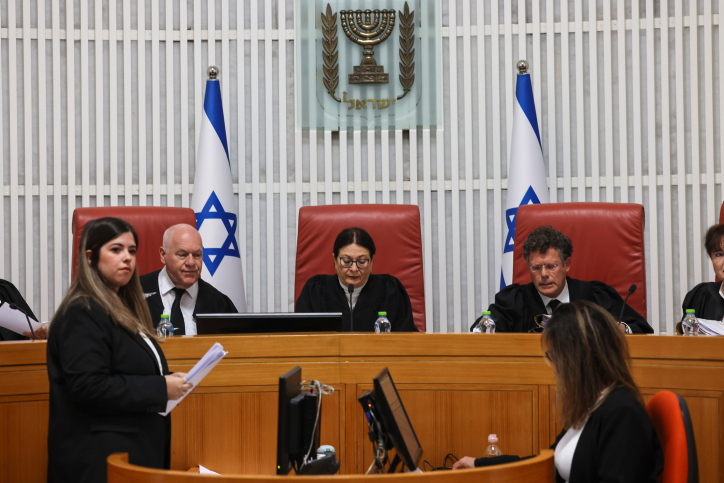
The Supreme Court ruled last Tuesday that foreign workers who did not leave the country on time will no longer be denied their pension funds, and demanded that the state rectify the existing situation within six months.
The Workers Hotline and the Association for Civil Rights (ACRI) submitted petitions against the statute in place that withheld a portion of foreign workers' paycheck as leverage to ensure they leave on time. The petition passed by a majority opinion of six, including Supreme Court President Ester Hayut, Vice President Uzi Fogelman and judges Yitzhak Amit, Dafna Barak-Erez, Anat Baron and Ofer Grosskopf. Judge Noam Solberg ruled in a minority opinion that the petitions should be rejected.
According to the Foreign Workers Law from 1991, every employer of a foreign worker within specific industries, will be required to deposit on a monthly basis all the social contributions for which the employer is liable. Receival of the deposited money is conditional upon the foreign worker's departure from Israel before their visa expires.
The petitions argued that the existing statute severely and disproportionately harms the rights of the foreign workers, and should therefore be annulled. According to one of the precedents cited in the petition, a Chinese citizen who worked in Israel in the construction industry legally for 12 years and had 93,717 shekels in his deposit, did not receive the full amount due to his departure from Israel after the deadline set for him.
The Supreme Court ruled in favor of the petitions, stating that the existing financial penalty is disproportionate and does violate the foreign workers' right to property; a right that is derived from the Basic Law on Human Dignity and Freedom. In addition, it was determined that increasing the foreign worker's incentive to leave Israel is a worthy purpose, but there is no other country where migrant workers may lose their pension funds if they leave the country late.
The judges of the majority opinion determined that the data presented by the government raised significant questions regarding the effectiveness of the current arrangement. According to them, the financial penalty could be extremely damaging. The statute exposes the employee to the possibility of losing all the social security payments deposited for them during their employment in Israel; sums that may reach tens or even hundreds of thousands of shekels. Such a penalty could be due to a delay of a few months in the foreign worker’s departure from Israel.
The majority of judges came to the conclusion that the financial penalty in relation to foreign workers disproportionately affects the right to property, and therefore it is unconstitutional. Judge Noam Solberg, in his dissent, countered that there is no room to interfere in the financial penalty, because the right to property is not infringed.
The Supreme Court clarified that there is no flaw in the financial penalty itself, but rather that in its current form is too extreme. Exposing the foreign worker to the deduction of the full amount of the deposit is unlawful. Therefore, the Supreme Court clarified that it does not intend to completely annul the financial penalty, since such a move may harm the purpose of encouraging the departure of foreign workers from Israel on time.
However, the judges ruled that if an alternative arrangement is not formulated within six months, the existing financial penalty statute will be canceled and the funds deducted from it will be settled to the workers who are entitled to them. With regard to the individual petitioners who submitted their claims, it was determined that they will receive the deposit money that was denied to them.
Justice Minister Yariv Levin, one of the main proponents of the judicial reform measures, harshly attacked the Supreme Court's decision.
"If anyone had any doubts as to why a deep reform of the judicial system was needed, he received the answer again today with another ruling that encourages illegal immigration to Israel while harming the demographic composition and the Jewish identity of the country," he said.
According to Levin, "the ruling gives the green light to tens of thousands of foreign workers to violate the terms of their visa and remain in Israel unhindered in violation of the law. The ruling reflects extreme progressive values, according to which foreign workers who remain in Israel contrary to their commitment and contrary to the law are preferable to preserving Israel's identity as a state.”
Minister of National Security Itamar Ben Gvir also strongly criticized the ruling.
"The Supreme Court once again struck down a law designed to encourage foreign workers to leave Israel,” he said. “Today's Supreme Court disqualification is the exact proof why we are fighting with all our might to pass the legal reform."
The Worker’s Hotline and the Civil Rights Association of Israel congratulated the decision.
"The verdict speaks for itself,” they said in a statement. “A law that allows for the expropriation of pension funds and the dismissal of workers is an evil law, and it is not for nothing that there is no such arrangement anywhere else in the world. Those who are invited to work in Israel in difficult jobs are as entitled as any other worker to the rights they earned at work.”
The organizations added: "it is clear to us that now it will be the turn of the members of the extreme right-wing coalition to insult the Supreme Court, which does not allow them to do whatever they want. We will remind them that human rights belong to every person, even those who do not have political power, and the role of the Supreme Court is to stop the Knesset and the government when they encroach on those rights."
The petitioners were represented in the proceedings by attorneys Michal Tager, Oded Peller and Elad Kahana.
This article was translated from Hebrew by Etz Greenfeld.






